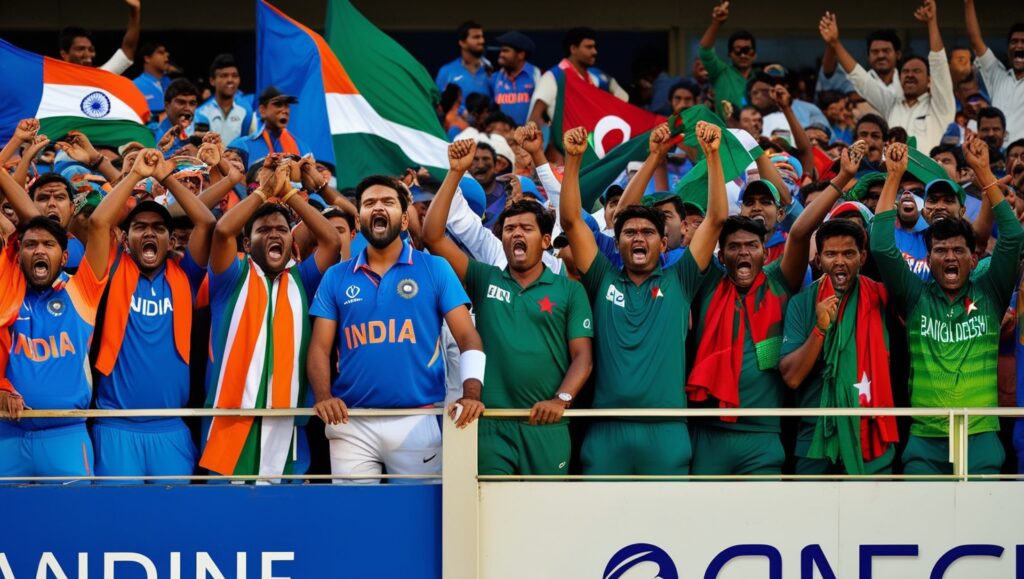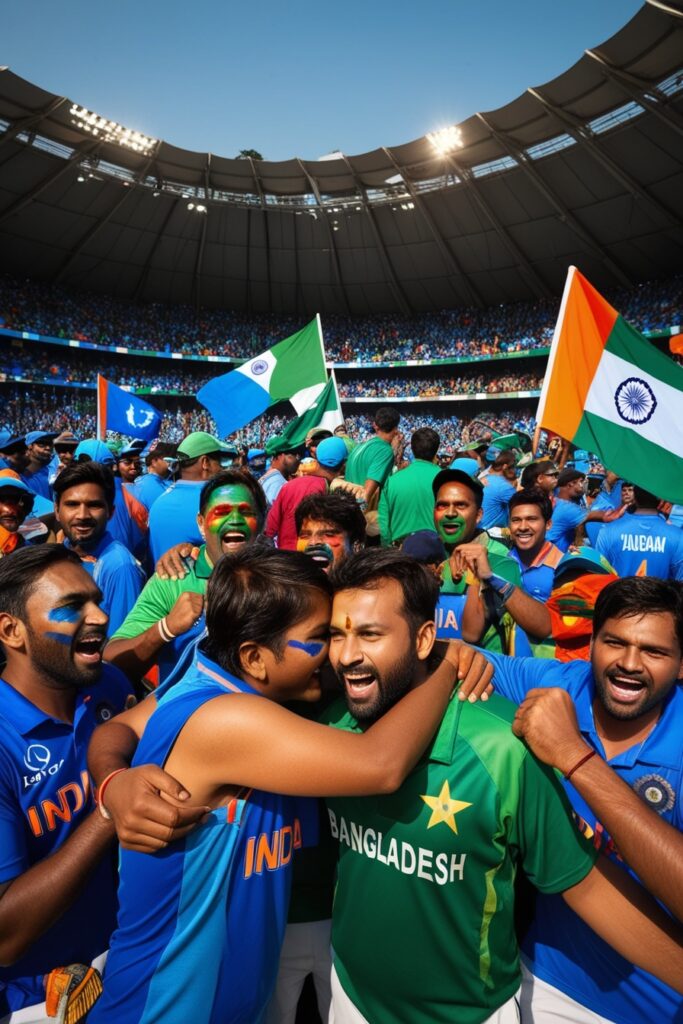Table of Contents
ToggleThe Psychological Impact of Nowadays India vs Bangladesh Cricket Matches on Fans: A Deep Dive into Fan Psychology

Cricket isn’t just a game in South Asia—it’s a way of life, a unifying force, and sometimes, a source of intense emotional highs and lows. For fans in India and Bangladesh, cricket matches between their teams represent more than just competition; they’re battles of pride, identity, and national prestige. The fierce rivalry between these two nations has grown so intense that the psychological impact on their passionate fans can be overwhelming.
But why do India vs Bangladesh cricket matches evoke such strong emotions? What drives fans to feel elated after a victory or shattered after a defeat? This article takes a deep dive into fan psychology, exploring the emotional rollercoaster fans experience during these matches and why their behavior has been shaped by this iconic rivalry.
Ready to dive into the minds of cricket’s most passionate supporters?
The Evolution of the India vs Bangladesh Cricket Rivalry

The India vs Bangladesh cricket rivalry has come a long way from its early days. While India has historically been a powerhouse in cricket, Bangladesh’s rise to prominence has added an exciting new chapter to the rivalry. Key matches, such as the 2007 ICC World Cup clash where Bangladesh stunned India, have solidified the fierce competition between the two nations.
Since then, each India vs Bangladesh match carries heightened significance, with emotions running high. Both teams are now contenders in major tournaments, turning every game into a high-stakes affair that feels like a final. Fans from both sides bring their passion and pride, transforming each game into a spectacle of national importance.
Why Are Fans So Emotionally Invested? The Psychology Behind It

Ever wondered why cricket fans are so emotionally invested in every match? It all comes down to fan psychology. Research has shown that when people strongly identify with a team, they tie their personal self-worth and emotions to the team’s performance. A study published in the Journal of Sport and Exercise Psychology revealed that fans of rival teams experience heightened emotions during high-stakes games, particularly when national pride is on the line.
In countries like India and Bangladesh, where cricket is part of the cultural fabric, the emotional investment goes deeper. Fans don’t just watch cricket—they live and breathe it. Victories bring feelings of pride and triumph, while losses can leave fans in deep despair. This emotional bond is why every India vs Bangladesh match feels like a matter of national importance.
What Makes the India vs Bangladesh Matches So Intense?

Several factors make India vs Bangladesh matches some of the most intense cricketing encounters:
- National Pride: For both countries, cricket is tied to national identity. Every run, wicket, and boundary feels like a victory for the entire nation. A win isn’t just a game; it’s a matter of pride and prestige.
- Historical Tensions: While India and Bangladesh have friendly relations off the field, there are underlying historical tensions that add fuel to the fire. Cricket becomes a medium through which these emotions are expressed.
- Media Hype: The media plays a huge role in building anticipation before a match, often turning even routine games into high-drama events. Add to this the intense scrutiny players face, and the stakes become sky-high.
- Social Media Impact: With the rise of platforms like Twitter, Facebook, and Instagram, fans now have a space to express their emotions instantly. Whether it’s memes, banter, or heated debates, social media amplifies the rivalry and can sometimes make it even more personal
The Emotional Roller-Coaster of High-Stakes Matches
The psychological journey fans go through during an India vs Bangladesh match can be best described as a roller-coaster of emotions. Before the match, anticipation and anxiety build. Will their team win? Can their team beat the rival? These thoughts often create feelings of stress and excitement.
During the match, emotions swing dramatically—every wicket, every boundary, and every close call causes surges of adrenaline. When a key moment happens, like a brilliant catch or a controversial umpiring decision, the emotions can skyrocket. Victory brings a rush of euphoria and a sense of national pride, while defeat leaves fans feeling gutted and sometimes even angry.


How Wins and Losses Impact Fans’ Mental Health
For die-hard cricket fans, wins and losses aren’t just part of the game—they can affect mental health. Studies show that sports fans can experience elevated levels of stress and anxiety during tense matches, particularly when it involves their favorite teams. A victory for India over Bangladesh, or vice versa, creates an emotional high that lasts for days. Fans feel a sense of unity and accomplishment.
But on the flip side, defeat can hit hard. According to research from the International Journal of Sport and Exercise Psychology, fans often experience feelings of depression and frustration after their team loses, especially in high-profile games. The psychological toll is even greater when expectations are high, and the loss feels like a letdown for the entire country.
Social Identity and the “Us vs. Them” Mentality
Social identity plays a massive role in shaping fan behavior during cricket matches. Fans see their team as an extension of themselves, and this sense of shared identity leads to the classic “us vs. them” mentality. When India and Bangladesh play, it’s not just two teams—it feels like two nations are clashing. This group identity intensifies emotional responses, as fans feel personally involved in the outcome of the game.
This “us vs. them” mentality can also foster solidarity among fans. Shared victories create collective euphoria, while shared losses create collective disappointment. Fans form a community of like-minded people, united by their passion for cricket and their national pride.

Coping Mechanisms: How Fans Deal with Defeat
So, how do fans cope when their team loses? Sports psychologists have identified several coping mechanisms that fans use to deal with the emotional turmoil of defeat. Some common ones include:
- Rationalizing: Telling themselves, “It’s just a game,” or “There’s always next time” helps fans come to terms with a loss.
- Superstitions: Many fans develop rituals, like wearing a specific jersey or sitting in the same spot during every match, believing it will bring their team luck.
- Optimism: Holding onto hope for the future, even when things go wrong, is another way fans stay emotionally resilient.

According to a study in Frontiers in Psychology, these coping strategies help fans maintain a healthy emotional balance, even when their team doesn’t win.
The Impact of Cricket Rivalry on Young Fans
For younger fans, the India vs Bangladesh rivalry is more than just a sports event; it’s part of their upbringing. The emotional highs and lows of these matches shape their understanding of competition, resilience, and national pride. Studies show that children who grow up watching intense rivalries are more likely to develop lifelong emotional connections to their teams.
Witnessing moments of glory, like a key victory in a World Cup, leaves a lasting imprint on young minds, shaping their future emotional attachment to the sport and the teams they support.
Social Media and the Digital Age: How Fan Behavior is Changing
In today’s digital era, fan behavior has evolved dramatically. Platforms like Twitter, Instagram, and Facebook have given fans a voice that can be heard instantly and globally. According to a study published in Computers in Human Behavior, social media allows fans to share their emotions in real-time, creating a collective experience during matches.
But there’s a downside—social media can also amplify negative behavior, such as trolling or online abuse. In the heat of the moment, especially after a loss, fans may lash out at players or opposing fans, leading to toxic environments online.
Cricket as a Cultural Phenomenon in India and Bangladesh

Cricket holds a unique place in the hearts of people in India and Bangladesh. It’s more than just a sport—it’s a cultural and emotional outlet. According to research from Sports in Society, cricket serves as a tool for national expression and unity. Fans feel connected to their country through the game, and the sport becomes a reflection of their identity.
In Bangladesh, cricket is often seen as a symbol of the nation’s rise on the world stage, while in India, cricket remains a deeply entrenched part of the country’s culture, drawing millions of fans who live and breathe the game.
It’s not uncommon for cricket results to spill over into daily life. Victories are celebrated with street parties, fireworks, and public gatherings, while losses can lead to a more somber mood, even impacting workplaces, schools, and homes. According to research from the European Journal of Sport Science, emotional investment in sports can affect mood and productivity, with fans feeling either elated or deflated after key matches.
Extreme reactions are not unusual, from widespread celebrations after a win to mass protests or public outcry following a controversial loss. Cricket truly influences the pulse of everyday life in both India and Bangladesh.
When Cricket Affects Daily Life: The Emotional Aftermath

Sportsmanship vs. Rivalry: Keeping Things Healthy

While the rivalry between India and Bangladesh is fierce, it’s important to maintain a sense of sportsmanship. Respect between fans and players helps keep the spirit of competition alive without descending into hostility. After all, cricket is about celebrating the sport’s beauty, skill, and unpredictability.
Promoting sportsmanship is crucial in ensuring that fans enjoy the game while keeping emotions in check. Sports psychologists recommend focusing on the positive aspects of the game, rather than solely on winning or losing.
Mental Health Concerns in Extreme Fan Culture
For some fans, the emotional investment in cricket can become unhealthy. According to the Journal of Applied Sport Psychology, extreme fandom can lead to stress, anxiety, and even obsession. Sports psychologists advise fans to develop healthier relationships with their favorite teams, ensuring that cricket remains a source of enjoyment rather than a cause of emotional distress.

FAQs
- Why is the India vs Bangladesh cricket rivalry so intense?
The rivalry stems from national pride, historical tensions, and the growing competitiveness of both teams, making every match feel like a high-stakes event. - How does social media influence fan behavior during matches?
Social media amplifies emotions, giving fans a platform to instantly react, share memes, and vent their frustrations, often intensifying the rivalry. - What are the emotional effects of winning or losing a match?
A victory brings euphoria and a sense of national pride, while a loss can lead to frustration, anger, and even depression for some fans. - How do young fans experience the rivalry?
Young fans are deeply influenced by the rivalry, with the emotional highs and lows shaping their lifelong attachment to cricket and their national teams. - How can fans maintain a healthy emotional balance during high-stakes matches?
Focusing on the enjoyment of the game, practicing optimism, and avoiding toxic behavior online can help fans maintain a healthy relationship with cricket.